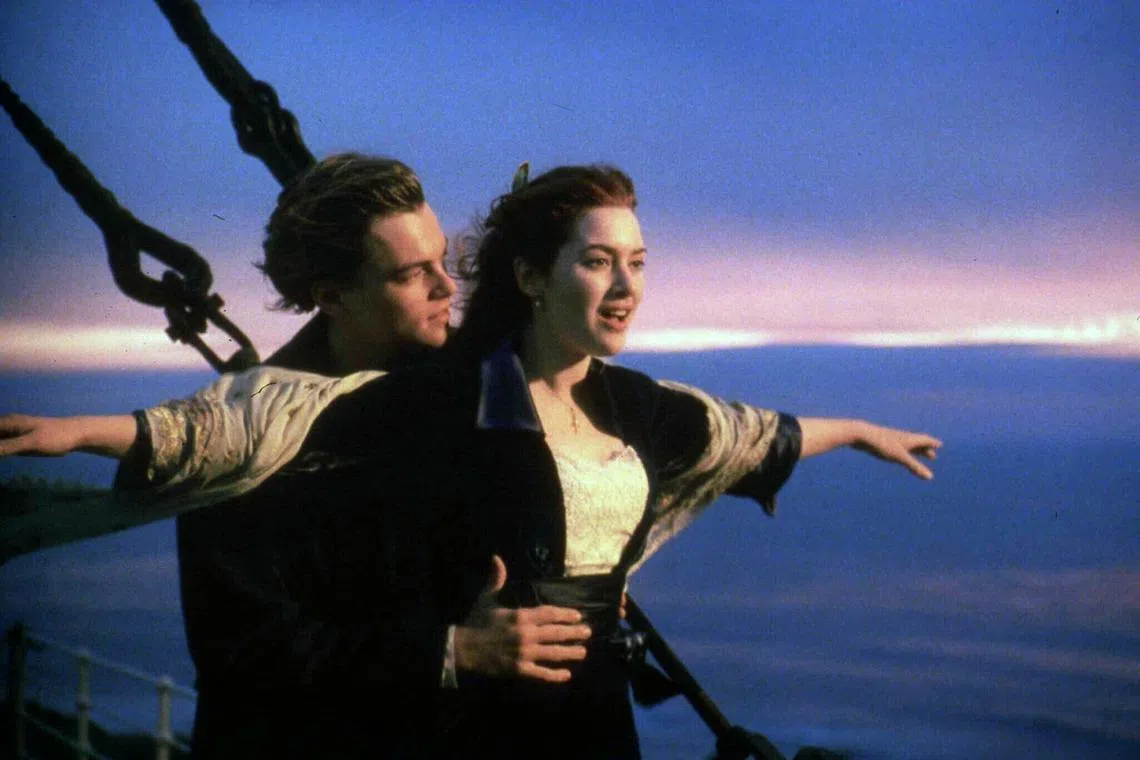Jack could have survived, says James Cameron as Titanic is re-released 25 years on
Sign up now: Get ST's newsletters delivered to your inbox

Leonard DiCaprio as Jack and Kate Winslet as Rose in the movie Titanic.
PHOTO: 20TH CENTURY FOX
Los Angeles – James Cameron does not have many regrets – after all, he has now directed three of the four highest-grossing films of all time.
But if he could go back and remake Titanic (1997), the film that started his record streak 25 years ago and was re-released in Singapore cinemas on Thursday, there is one thing he would change.
“Based on what I know today, I would have made the raft smaller, so there’s no doubt,” said Cameron, 68.
Such is the film’s enduring popularity, even a quarter of a century later, that debates and theories continue to swirl around the fate of actor Leonardo DiCaprio’s lead character.
Fans insist Jack could have survived the icy Atlantic waters after the ocean liner sank, if only he had shared an improvised raft with actress Kate Winslet’s Rose.
Instead, Jack gallantly gave Rose a wooden door to float on, condemning himself to a freezing death, but ensuring she survived.
It is just one example of how the story of the Titanic “never seems to end for people”, Cameron told a press conference held for the anniversary re-release.
“There have been much greater tragedies since the Titanic – I mean, World War I, tens of millions of people died. World War II...
“But the Titanic has this kind of enduring, almost mythic, novelistic quality. And it has to do with, I think, love and sacrifice and mortality.
“The men who stepped back from the lifeboats so that the women and the children could survive.”
‘Final verdict’
Cameron put Jack’s sacrifice to the test in a new National Geographic documentary, running experiments featuring two stunt performers and an exact replica of the film’s door in a cold water tank.
In Titanic: 25 Years Later With James Cameron, the stunt actors were fitted with internal thermometers to chart how quickly their bodies plunged towards hypothermia.

Canadian film-maker James Cameron.
PHOTO: AFP
While the first test confirmed Jack would have died if he had acted according to the film’s plot, a second found the pair could have both balanced on the door and kept their upper bodies out of the water.
“He got into a place where, if we projected that out, he just might have made it until the lifeboat got there,” admitted Cameron. “Final verdict? Jack might have lived. But there’s a lot of variables.”
Epic love story
Titanic was released in December 1997 and held the No. 1 box-office spot for 15 consecutive weekends.
While today, most films earn their biggest profits on opening weekend, Titanic peaked on its eighth weekend – Valentine’s Day.
The epic love story is now being re-released ahead of 2023’s Valentine’s Day weekend, which will further bolster its US$2.2 billion (S$2.9 billion) total haul.
“I’ll grant you US$100 million of our box office (was) for Leonardo DiCaprio’s appeal to 14-year-old” girls, joked Cameron.
Titanic is now behind only Avengers: Endgame (2019) and Cameron’s Avatar (2009), but is expected to soon be surpassed by Avatar: The Way Of Water (2022) – again, by Cameron – which has made US$2.18 billion and is still drawing crowds.
Collectively, Cameron’s three monster hits have collected US$7.25 billion – roughly the annual gross domestic product of Bermuda.
Besides making him an extraordinarily wealthy man, the three-hour Titanic film has left another important, if divisive, legacy.
“Historically before Titanic, the wisdom – which proved not to be true – was that a long movie can’t make money,” said Cameron.
The first Avatar ran for two hours and 42 minutes, and again “people said they wanted more”, he said.
“We took that to heart and we made a three-hour-and-12-minute movie for the new Avatar.
“And it’s doing very well.” AFP


